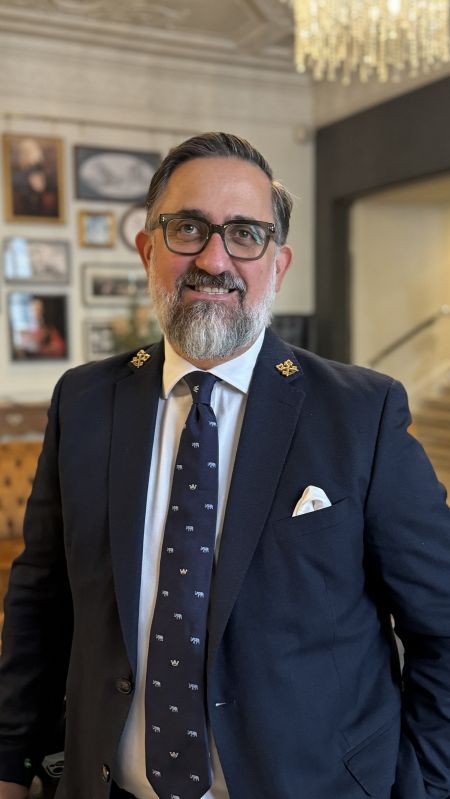 |
BURAK IPEKCI, GENERAL SECRETARY, LES CLEFS D'OR INTERNATIONAL: "MOST CAREER CONCIERGES DON'T FIND THE JOB; THE JOB FINDS THEM"
With a sweeping view of a hotelís life, Burak Ipekci, shares his insights on the evolving role of luxury hospitality's most enigmatic profession. |
Category: Worldwide - Careers
- Interviews and portraits
- Career - Interviews - Industry leaders
Interview made by Sonia Taourghi on Monday 09 December 2024
 Burak Ipekci, General Secretary, Les Clefs d'Or International
Photo credit © Les Clefs d'Or International
Throughout our conversation at his London hotel, where he oversees Concierge operations with an impressive view of the lobby, Burak shares insights into the evolving nature of hospitality, the industry's challenges, and his mission to diversify and strengthen the Concierge profession. His passion for service is evident as he describes the unique position concierges hold within hotels – they are, as he puts it, “the only employees hired simply to make people happy”.
With the hospitality industry facing significant changes, from technological advances to shifting guest expectations, Burak's perspective offers valuable insights into how traditional roles can adapt while maintaining their essential human element. His dedication to preserving Les Clefs d'Or's traditions and pushing for progress, particularly in gender diversity, reflects the delicate balance between heritage and innovation in luxury hospitality.
Journal des Palaces: What does it take to be a good concierge?
Burak Ipekci: Empathy is crucial – you must genuinely be interested in people. This isn't something that can be taught; it's an inherent quality that defines successful concierges. We wait several years before considering someone for Les Clefs d'Or membership.
The job can appear glamorous from the outside, with invitations to restaurants and shows, but it's incredibly demanding. You're simultaneously managing expectations from the hotel, external suppliers, and guests. Unlike other hotel roles where you might handle specific tasks, concierges are hired simply to make people happy – we're the only position without a tangible product. We are the product.
You need to maintain the same freshness, enthusiasm, and attention for every guest who walks through the door, regardless of how many guests you've helped before. There's no hiding place, no back office to retreat to. This is why not everyone is cut out for the role and why we very carefully select our members.
How has the concierge role evolved, especially with the rise of technology?
The evolution has been dramatic, but not in the way many predicted. Initially, when the internet emerged, people feared it would be the end of concierge services. Instead, it became a tool that enhanced our capabilities. Today's challenge is different – guests arrive with more information than ever. They come with lists of recommendations from friends and social media, asking us to verify and curate rather than simply provide information. This actually makes our job more demanding because we need to understand not just the venues but also the guests' preferences and personalities to make appropriate recommendations. The relationships we build with vendors and our ability to secure reservations have become even more crucial because everyone has access to the same information. Technology, including AI, can handle transactions, but it can't provide the personal touch – noticing that a café two doors down from an attraction serves amazing brownies and suggesting it because you sense the guest would appreciate it. That's where human intuition and personal interaction remain irreplaceable.
Tell us about your approach to team management and recruitment.
I take great pride in having the lowest turnover in my company. Nonetheless, I'm experiencing first-hand the challenges of recruitment.
When building a team, I always look for diversity in languages and demographics to match our guest profiles. It's crucial for guests to see themselves reflected in our team – if all they see behind the concierge desk is a "middle-aged, over-weight, white guy," what does that say about the institution? Our guests come from all walks of life, and our teams must represent that same diversity. The easiest way to build rapport with guests is for them to see themselves in you. When people feel appreciated for what they bring, they always perform better.
How do you see the future of hospitality and guest expectations evolving?
The more technology advances, the more crucial human interaction becomes. When I started 25 years ago, guests asked, "What should I do?" Now, they come armed with research and specific requests, making our role more complex. We've evolved from itinerary creators to trusted verifiers and curators.
The challenge isn't just knowing about venues anymore; it's understanding which of the countless options truly suits each individual guest. This requires a deeper level of personal interaction and understanding. The relationships we build with vendors have become even more critical because there's increased competition for limited resources – when a restaurant has 80 covers, and 150 people want them, someone must know how to make it impossible. That is where our value lies.
While technology can handle transactions and provide information, it can't replicate the human ability to read people, understand their unstated preferences, and create personalised experiences that surprise and delight.
Can you tell us about Les Clefs d'Or's structure and mission?
Les Clefs d'Or operates as a strictly democratic organisation, where members report to their section presidents, who in turn form our global board of directors. We're a society with secrets, not a secret society.
As part of the international executive, we function as a governing body, but we don't make unilateral decisions – we execute the collective decisions of the board of directors. While sometimes perceived as merely social events, our gatherings, both regional and international, are crucial for education and networking.
This year, we had speakers from Forbes and Microsoft focusing on AI and hospitality. Our mission isn't about expansion for expansion's sake; we focus on quality over quantity. Each new member must be vouched for by existing members, who stake their reputation on the candidate's ability to uphold our standards. Currently, we have around 3,300 members worldwide, down from 4,200 pre-pandemic but up from 2,300 during the crisis. Our strength varies by region – we're particularly robust in Europe and the Americas, but we're working to strengthen our presence in Southeast Asia.
What initiatives are you currently focused on within Les Clefs d'Or?
One of my primary focuses has been addressing the gender imbalance within our organisation. While some sections, like the US and Canada, have almost equal representation, others show concerning disparities. In the UK, for example, female membership is only 11%, and some sections have no female members. To me, this is mind-boggling in 2024.
We've started tracking these demographics more carefully, working within privacy laws to understand and address these imbalances. I recently travelled to India to speak about increasing female membership because this change needs to happen globally. The hospitality industry serves guests from all walks of life, and our teams need to reflect that diversity.
We're also strengthening our educational initiatives and industry partnerships, creating videos about the art of hospitality from a concierge perspective, and working to elevate the profession's profile. The goal is to inspire the next generation while maintaining the high standards that have defined Les Clefs d'Or for over 70 years.
Why would you say the concierge has such a vital role in luxury hospitality?
The pandemic's impact was actually the opposite of what many feared. While hospitality was one of the hardest-hit industries, and some companies hastily reduced their teams despite furlough options, the aftermath proved concierges’ value even more.
With the explosion of technology during the pandemic, hotels realised they needed fewer front desk staff – what used to require 14 agents now needs only four, as people checked themselves in and out using their phones.
This actually elevated the concierge position because we're jacks of all trades who understand every department's operation. We function as a bottleneck, facilitating communication between the outside world and internal operations. Once the pandemic chaos subsided, there was a recruitment surge for concierges.
What advice would you give someone aspiring to become a concierge?
The most important thing is to understand that this isn't just a job – it's a lifestyle. You have to genuinely love what you do because it's demanding in ways that aren't immediately apparent. While we get invited to restaurants and shows, these aren't perks but business transactions that require additional time beyond our regular hotel hours. We must retain and process all this information to provide personalised recommendations to guests.
Remember, for us, each guest is one of thousands, but for them, we are their primary point of contact. They expect us to remember their preferences and provide consistently excellent service. Most career concierges don't find the job; the job finds them. Someone sees that spark in their eye, that natural inclination toward service. The key is empathy and a genuine interest in people. You can teach anyone procedures and protocols, but you can't teach someone to care genuinely about others' happiness.
That's why we wait several years before considering someone for Les Clefs d'Or membership – we need to see that this isn't just a job for them but a calling.
|
|







